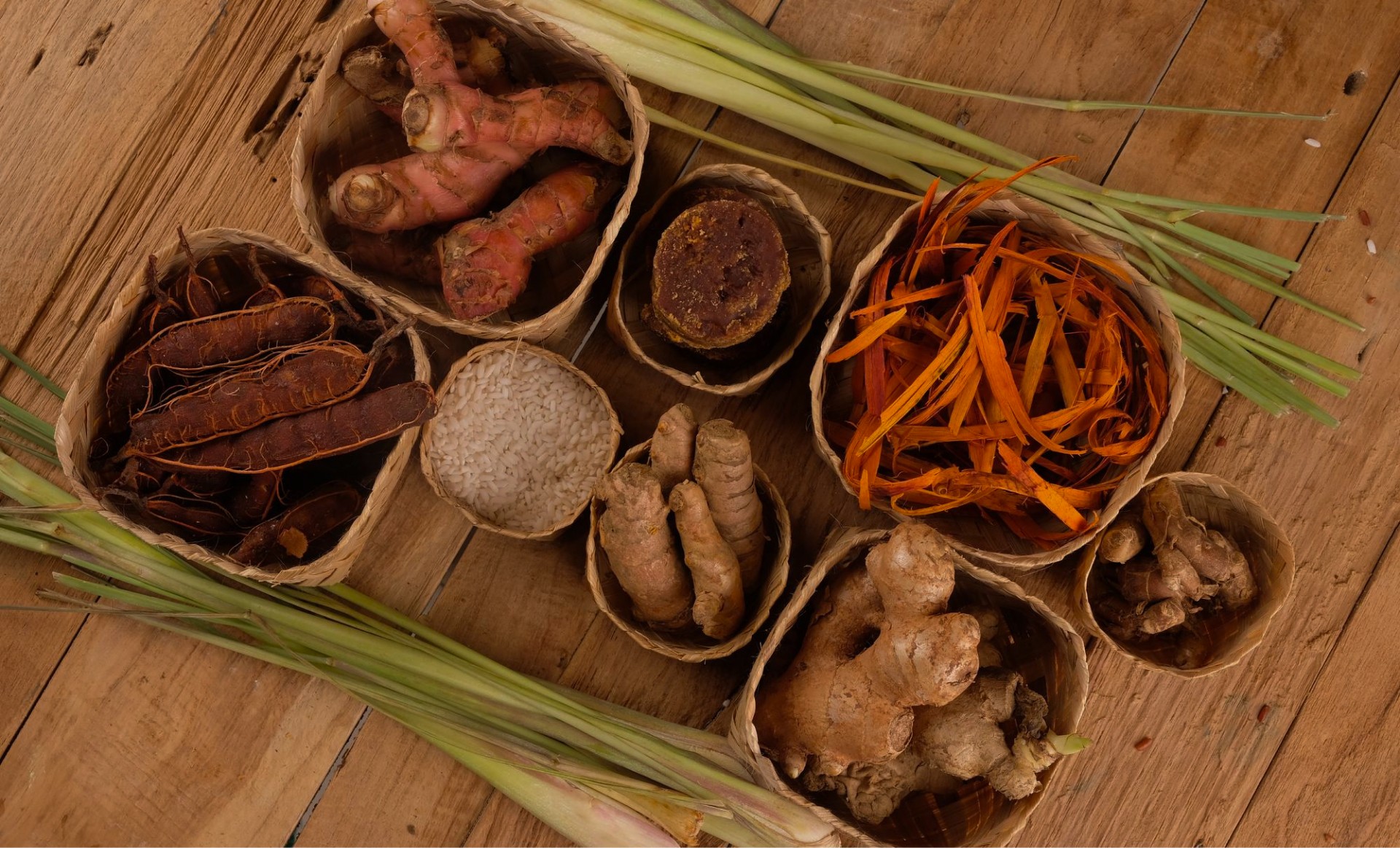In a world often hurried and distant, Jamu invites you to slow down, to reconnect, to savor.
This is more than a drink—it’s a tradition, a daily reminder that wellness begins from within. Passed down through centuries, from healer to healer, Jamu carries with it the voices of countless Indonesian women and families who saw wellness as a way of life, not a luxury.
Here, you’ll discover not just a drink, but a living piece of history, as vibrant today as it was over 1,300 years ago.
In a world often hurried and distant, Jamu invites you to slow down, to reconnect, to savor.
This is more than a drink—it’s a tradition, a daily reminder that wellness begins from within. Passed down through centuries, from healer to healer, Jamu carries with it the voices of countless Indonesian women and families who saw wellness as a way of life, not a luxury.
Here, you’ll discover not just a drink, but a living piece of history, as vibrant today as it was over 1,300 years ago.
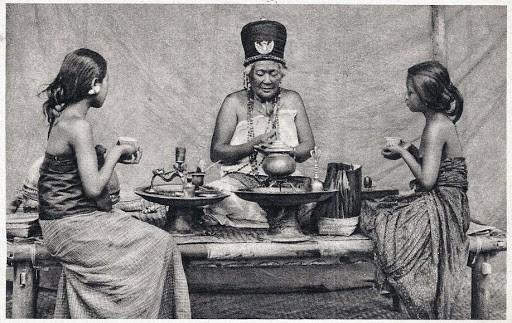
Balinese priest's fasting and praying process before concocting jamu, Acaraki, From the collection of: Indonesia Gastronomy Network
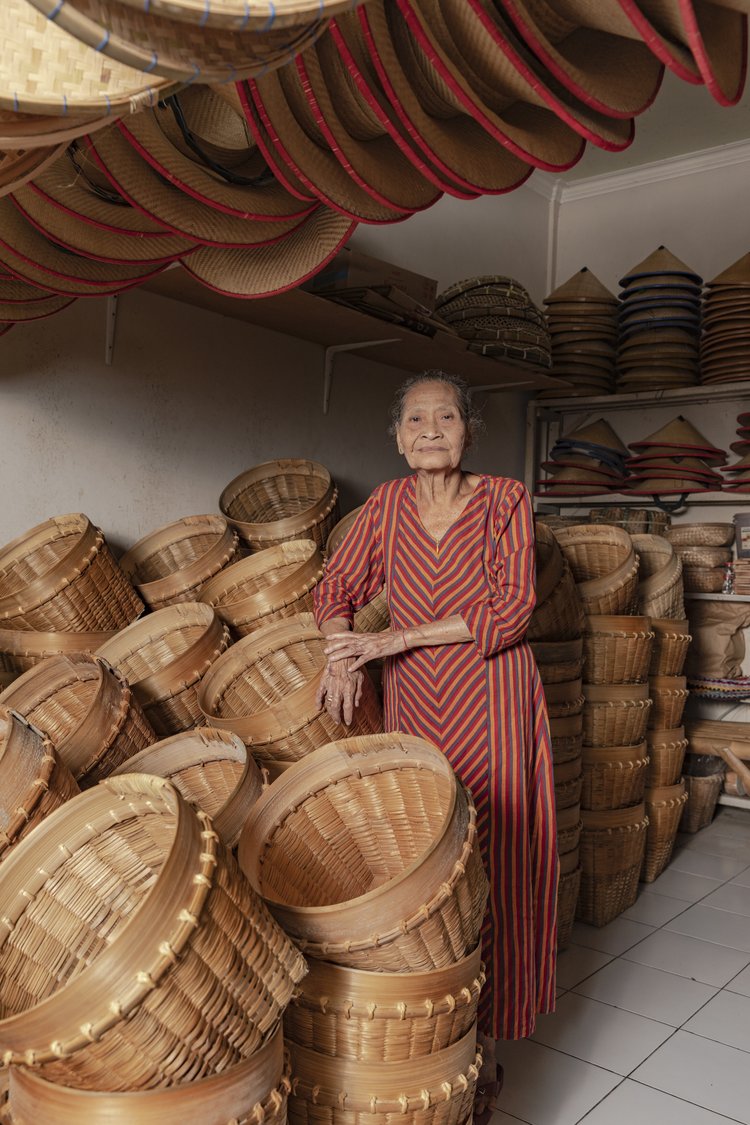

Portrait of Yatmini, 80, supplier of Jamu ingredients and supplier at Nguter Jamu Market in Sukoharjo Regency, Solo, Central Java, Indonesia. Photograph by Nyimas Laula.
What is Jamu?
A Heritage of Healing and Connection
What is Jamu?
A Heritage of Healing and Connection
Jamu, in its simplest form, is Indonesia’s gift to holistic health—a collection of herbal potions crafted to honor both body and spirit. Its roots trace back to the royal courts of ancient Java, where Acaraki, village healers, blended herbs and roots with care and reverence. The Acarakis didn’t just prepare Jamu; they infused it with prayers and intentions, believing each sip held the power to heal body and soul. For them, Jamu wasn’t simply medicine; it was a gift, passed down with respect for nature and community.
Jamu, in its simplest form, is Indonesia’s gift to holistic health—a collection of herbal potions crafted to honor both body and spirit. Its roots trace back to the royal courts of ancient Java, where Acaraki, village healers, blended herbs and roots with care and reverence. The Acarakis didn’t just prepare Jamu; they infused it with prayers and intentions, believing each sip held the power to heal body and soul. For them, Jamu wasn’t simply medicine; it was a gift, passed down with respect for nature and community.
As Jamu’s popularity grew, this knowledge began to spread beyond the courts and temples. Everyday people, especially women, began crafting Jamu for their villages. Over time, some of these women turned Jamu into their livelihood, carrying glass bottles filled with golden, green, and amber potions through neighborhoods. These were the jamu gendong women, often seen with baskets on their backs, offering wellness to everyone from farmers to children. They were, and still are, beloved figures—symbols of care, strength, and the art of nurturing, selling each bottle with warmth and intention.
As Jamu’s popularity grew, this knowledge began to spread beyond the courts and temples. Everyday people, especially women, began crafting Jamu for their villages. Over time, some of these women turned Jamu into their livelihood, carrying glass bottles filled with golden, green, and amber potions through neighborhoods. These were the jamu gendong women, often seen with baskets on their backs, offering wellness to everyone from farmers to children. They were, and still are, beloved figures—symbols of care, strength, and the art of nurturing, selling each bottle with warmth and intention.


Portrait of Yatmini, 80, supplier of Jamu ingredients and supplier at Nguter Jamu Market in Sukoharjo Regency, Solo, Central Java, Indonesia. Photograph by Nyimas Laula.
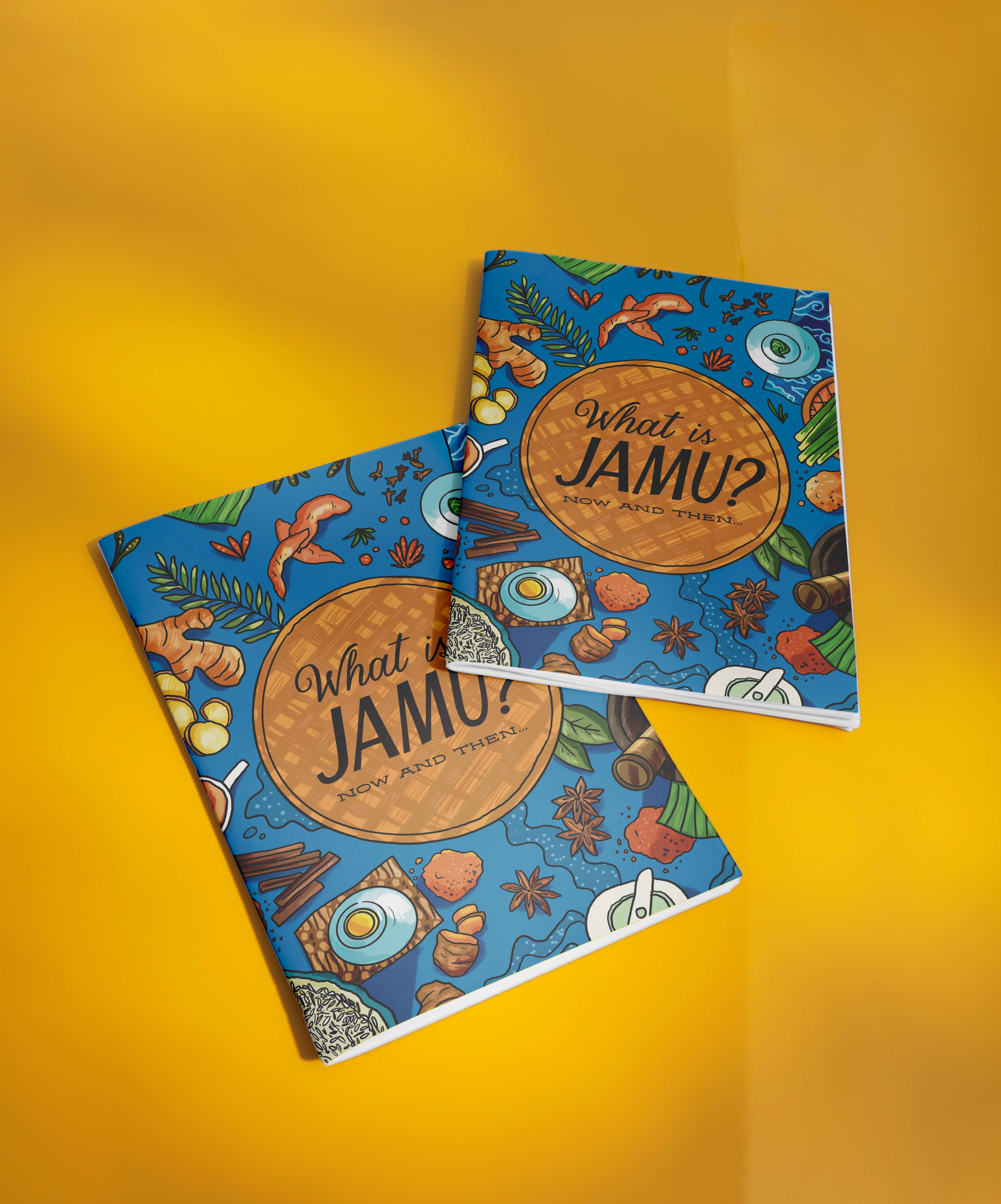
Want to Learn More About Jamu?
We’re excited to announce that our "What is Jamu?" booklet is now available! Full of stories and beautiful illustrations, it’s your guide to Indonesia’s wellness tradition—perfect for exploring Jamu at home.

Want to Learn More About Jamu?
We’re excited to announce that our "What is Jamu?" booklet is now available! Full of stories and beautiful illustrations, it’s your guide to Indonesia’s wellness tradition—perfect for exploring Jamu at home.

Want to Learn More About Jamu?
We’re excited to announce that our "What is Jamu?" booklet is now available! Full of stories and beautiful illustrations, it’s your guide to Indonesia’s wellness tradition—perfect for exploring Jamu at home.
Want to Learn More About Jamu?
We’re excited to announce that our "What is Jamu?" booklet is now available! Full of stories and beautiful illustrations, it’s your guide to Indonesia’s wellness tradition—perfect for exploring Jamu at home.

Jamu Varieties
Jamu Varieties
With roots that run deep, Jamu isn’t one recipe but thousands, each one crafted to care for the body and honor the spirit. Here are just a few beloved types, each holding its own character and purpose:
With roots that run deep, Jamu isn’t one recipe but thousands, each one crafted to care for the body and honor the spirit. Here are just a few beloved types, each holding its own character and purpose:
Kunir Asem
A well-loved variety, Kunyit Asam combines turmeric with tamarind, creating a bright, golden drink with a sweet-sour profile. Traditionally consumed by women, especially during menstruation, Kunyit Asam is valued for its anti-inflammatory properties from turmeric, which can help reduce bloating and discomfort. Tamarind, rich in antioxidants and vitamin C, adds a refreshing tanginess and supports digestive health. This drink is often seen as a rejuvenating tonic, providing comfort and support throughout life’s cycles.
beras kencur
Mild and warming, Beras Kencur is made with rice and aromatic ginger, also known as kencur. This variety is often shared with children as a gentle introduction to Jamu. The rice provides a smooth, comforting base, while kencur is known for its antimicrobial properties, helping to soothe minor ailments and support immunity. Beras Kencur is typically sweetened with palm sugar, adding an earthy sweetness. It’s a gentle drink that embodies nurturing care, often consumed for its calming effects on the stomach and for helping to build strength in children and adults alike.
Pahitan
Known as one of the most bitter varieties, Pahitan is crafted from bitter herbs like sambiloto (Andrographis paniculata) and brotowali (Tinospora cordifolia). These herbs have long been used in traditional Indonesian medicine for their detoxifying and anti-inflammatory effects. Pahitan is said to cleanse the body, promoting liver health, reducing blood sugar levels, and aiding digestion. Its bitterness may take some getting used to, but it’s regarded as a deeply purifying drink, often consumed by those seeking a natural way to bolster resilience and cleanse the body from within.
Gepyokan
Gepyokan is a Jamu variety that supports recovery after physical exertion or fatigue. Traditionally prepared with a blend of warming spices, such as ginger and temulawak (Java turmeric), it helps soothe muscle soreness and boost energy. Gepyokan is popular among those with active lifestyles or anyone needing extra rejuvenation, known to ease physical strain and restore strength.
Kudu Laos
Kudu Laos combines kudu (noni fruit) and laos (galangal) to create a warm and earthy Jamu that supports immunity and vitality. This variety is believed to promote cellular health, aid digestion, and offer anti-inflammatory benefits. Traditionally used to improve endurance and resilience, Kudu Laos is often appreciated for its grounding properties, providing warmth and vitality to those seeking balance and strength.
cabe puyang
Cabe Puyang combines the warmth of chili with puyang (Indian mulberry root), known for its blood-circulation-boosting properties. This variety is regarded as invigorating, promoting vitality and a sense of warmth in the body. Especially popular among younger individuals, Cabe Puyang symbolizes youthful energy and resilience, offering a gentle heat that boosts circulation and provides a natural energy lift.
kunci sirih
Kunci Sirih blends kunci (fingerroot) and sirih (betel leaf), both recognized for their antibacterial and hormone-balancing properties. Known for supporting women’s health, particularly in managing issues like vaginal discharge and body odor, Kunci Sirih is often tasteless yet potent. This Jamu embodies balance, calm, and health, especially for women, often consumed to support overall reproductive health and inner stability.
sinom
Sinom is a refreshing and light Jamu made from young turmeric leaves and tamarind. Known for its anti-inflammatory benefits and cooling effects, Sinom is rich in antioxidants and often enjoyed for digestive support. The young turmeric leaves provide a mild flavor, while tamarind adds a pleasant tang. This drink is associated with rejuvenation, often consumed on warm days as a refreshing and calming elixir.
Kunir Asem
A well-loved variety, Kunyit Asam combines turmeric with tamarind, creating a bright, golden drink with a sweet-sour profile. Traditionally consumed by women, especially during menstruation, Kunyit Asam is valued for its anti-inflammatory properties from turmeric, which can help reduce bloating and discomfort. Tamarind, rich in antioxidants and vitamin C, adds a refreshing tanginess and supports digestive health. This drink is often seen as a rejuvenating tonic, providing comfort and support throughout life’s cycles.
beras kencur
Mild and warming, Beras Kencur is made with rice and aromatic ginger, also known as kencur. This variety is often shared with children as a gentle introduction to Jamu. The rice provides a smooth, comforting base, while kencur is known for its antimicrobial properties, helping to soothe minor ailments and support immunity. Beras Kencur is typically sweetened with palm sugar, adding an earthy sweetness. It’s a gentle drink that embodies nurturing care, often consumed for its calming effects on the stomach and for helping to build strength in children and adults alike.
Pahitan
Known as one of the most bitter varieties, Pahitan is crafted from bitter herbs like sambiloto (Andrographis paniculata) and brotowali (Tinospora cordifolia). These herbs have long been used in traditional Indonesian medicine for their detoxifying and anti-inflammatory effects. Pahitan is said to cleanse the body, promoting liver health, reducing blood sugar levels, and aiding digestion. Its bitterness may take some getting used to, but it’s regarded as a deeply purifying drink, often consumed by those seeking a natural way to bolster resilience and cleanse the body from within.
Gepyokan
Gepyokan is a Jamu variety that supports recovery after physical exertion or fatigue. Traditionally prepared with a blend of warming spices, such as ginger and temulawak (Java turmeric), it helps soothe muscle soreness and boost energy. Gepyokan is popular among those with active lifestyles or anyone needing extra rejuvenation, known to ease physical strain and restore strength.
Kudu Laos
Kudu Laos combines kudu (noni fruit) and laos (galangal) to create a warm and earthy Jamu that supports immunity and vitality. This variety is believed to promote cellular health, aid digestion, and offer anti-inflammatory benefits. Traditionally used to improve endurance and resilience, Kudu Laos is often appreciated for its grounding properties, providing warmth and vitality to those seeking balance and strength.
cabe puyang
Cabe Puyang combines the warmth of chili with puyang (Indian mulberry root), known for its blood-circulation-boosting properties. This variety is regarded as invigorating, promoting vitality and a sense of warmth in the body. Especially popular among younger individuals, Cabe Puyang symbolizes youthful energy and resilience, offering a gentle heat that boosts circulation and provides a natural energy lift.
kunci sirih
Kunci Sirih blends kunci (fingerroot) and sirih (betel leaf), both recognized for their antibacterial and hormone-balancing properties. Known for supporting women’s health, particularly in managing issues like vaginal discharge and body odor, Kunci Sirih is often tasteless yet potent. This Jamu embodies balance, calm, and health, especially for women, often consumed to support overall reproductive health and inner stability.
sinom
Sinom is a refreshing and light Jamu made from young turmeric leaves and tamarind. Known for its anti-inflammatory benefits and cooling effects, Sinom is rich in antioxidants and often enjoyed for digestive support. The young turmeric leaves provide a mild flavor, while tamarind adds a pleasant tang. This drink is associated with rejuvenation, often consumed on warm days as a refreshing and calming elixir.
Kunir Asem
A well-loved variety, Kunyit Asam combines turmeric with tamarind, creating a bright, golden drink with a sweet-sour profile. Traditionally consumed by women, especially during menstruation, Kunyit Asam is valued for its anti-inflammatory properties from turmeric, which can help reduce bloating and discomfort. Tamarind, rich in antioxidants and vitamin C, adds a refreshing tanginess and supports digestive health. This drink is often seen as a rejuvenating tonic, providing comfort and support throughout life’s cycles.
beras kencur
Mild and warming, Beras Kencur is made with rice and aromatic ginger, also known as kencur. This variety is often shared with children as a gentle introduction to Jamu. The rice provides a smooth, comforting base, while kencur is known for its antimicrobial properties, helping to soothe minor ailments and support immunity. Beras Kencur is typically sweetened with palm sugar, adding an earthy sweetness. It’s a gentle drink that embodies nurturing care, often consumed for its calming effects on the stomach and for helping to build strength in children and adults alike.
Pahitan
Known as one of the most bitter varieties, Pahitan is crafted from bitter herbs like sambiloto (Andrographis paniculata) and brotowali (Tinospora cordifolia). These herbs have long been used in traditional Indonesian medicine for their detoxifying and anti-inflammatory effects. Pahitan is said to cleanse the body, promoting liver health, reducing blood sugar levels, and aiding digestion. Its bitterness may take some getting used to, but it’s regarded as a deeply purifying drink, often consumed by those seeking a natural way to bolster resilience and cleanse the body from within.
Gepyokan
Gepyokan is a Jamu variety that supports recovery after physical exertion or fatigue. Traditionally prepared with a blend of warming spices, such as ginger and temulawak (Java turmeric), it helps soothe muscle soreness and boost energy. Gepyokan is popular among those with active lifestyles or anyone needing extra rejuvenation, known to ease physical strain and restore strength.
Kudu Laos
Kudu Laos combines kudu (noni fruit) and laos (galangal) to create a warm and earthy Jamu that supports immunity and vitality. This variety is believed to promote cellular health, aid digestion, and offer anti-inflammatory benefits. Traditionally used to improve endurance and resilience, Kudu Laos is often appreciated for its grounding properties, providing warmth and vitality to those seeking balance and strength.
cabe puyang
Cabe Puyang combines the warmth of chili with puyang (Indian mulberry root), known for its blood-circulation-boosting properties. This variety is regarded as invigorating, promoting vitality and a sense of warmth in the body. Especially popular among younger individuals, Cabe Puyang symbolizes youthful energy and resilience, offering a gentle heat that boosts circulation and provides a natural energy lift.
kunci sirih
Kunci Sirih blends kunci (fingerroot) and sirih (betel leaf), both recognized for their antibacterial and hormone-balancing properties. Known for supporting women’s health, particularly in managing issues like vaginal discharge and body odor, Kunci Sirih is often tasteless yet potent. This Jamu embodies balance, calm, and health, especially for women, often consumed to support overall reproductive health and inner stability.
sinom
Sinom is a refreshing and light Jamu made from young turmeric leaves and tamarind. Known for its anti-inflammatory benefits and cooling effects, Sinom is rich in antioxidants and often enjoyed for digestive support. The young turmeric leaves provide a mild flavor, while tamarind adds a pleasant tang. This drink is associated with rejuvenation, often consumed on warm days as a refreshing and calming elixir.
Kunir Asem
A well-loved variety, Kunyit Asam combines turmeric with tamarind, creating a bright, golden drink with a sweet-sour profile. Traditionally consumed by women, especially during menstruation, Kunyit Asam is valued for its anti-inflammatory properties from turmeric, which can help reduce bloating and discomfort. Tamarind, rich in antioxidants and vitamin C, adds a refreshing tanginess and supports digestive health. This drink is often seen as a rejuvenating tonic, providing comfort and support throughout life’s cycles.
beras kencur
Mild and warming, Beras Kencur is made with rice and aromatic ginger, also known as kencur. This variety is often shared with children as a gentle introduction to Jamu. The rice provides a smooth, comforting base, while kencur is known for its antimicrobial properties, helping to soothe minor ailments and support immunity. Beras Kencur is typically sweetened with palm sugar, adding an earthy sweetness. It’s a gentle drink that embodies nurturing care, often consumed for its calming effects on the stomach and for helping to build strength in children and adults alike.
Pahitan
Known as one of the most bitter varieties, Pahitan is crafted from bitter herbs like sambiloto (Andrographis paniculata) and brotowali (Tinospora cordifolia). These herbs have long been used in traditional Indonesian medicine for their detoxifying and anti-inflammatory effects. Pahitan is said to cleanse the body, promoting liver health, reducing blood sugar levels, and aiding digestion. Its bitterness may take some getting used to, but it’s regarded as a deeply purifying drink, often consumed by those seeking a natural way to bolster resilience and cleanse the body from within.
Gepyokan
Gepyokan is a Jamu variety that supports recovery after physical exertion or fatigue. Traditionally prepared with a blend of warming spices, such as ginger and temulawak (Java turmeric), it helps soothe muscle soreness and boost energy. Gepyokan is popular among those with active lifestyles or anyone needing extra rejuvenation, known to ease physical strain and restore strength.
Kudu Laos
Kudu Laos combines kudu (noni fruit) and laos (galangal) to create a warm and earthy Jamu that supports immunity and vitality. This variety is believed to promote cellular health, aid digestion, and offer anti-inflammatory benefits. Traditionally used to improve endurance and resilience, Kudu Laos is often appreciated for its grounding properties, providing warmth and vitality to those seeking balance and strength.
cabe puyang
Cabe Puyang combines the warmth of chili with puyang (Indian mulberry root), known for its blood-circulation-boosting properties. This variety is regarded as invigorating, promoting vitality and a sense of warmth in the body. Especially popular among younger individuals, Cabe Puyang symbolizes youthful energy and resilience, offering a gentle heat that boosts circulation and provides a natural energy lift.
kunci sirih
Kunci Sirih blends kunci (fingerroot) and sirih (betel leaf), both recognized for their antibacterial and hormone-balancing properties. Known for supporting women’s health, particularly in managing issues like vaginal discharge and body odor, Kunci Sirih is often tasteless yet potent. This Jamu embodies balance, calm, and health, especially for women, often consumed to support overall reproductive health and inner stability.
sinom
Sinom is a refreshing and light Jamu made from young turmeric leaves and tamarind. Known for its anti-inflammatory benefits and cooling effects, Sinom is rich in antioxidants and often enjoyed for digestive support. The young turmeric leaves provide a mild flavor, while tamarind adds a pleasant tang. This drink is associated with rejuvenation, often consumed on warm days as a refreshing and calming elixir.

A Sip of Djamu Djamu, A Moment of Connection
A Sip of Djamu Djamu, A Moment of Connection
At Djamu Djamu, we believe that wellness isn’t just a practice but a shared journey. We invite you to take a sip and feel the richness of Indonesia’s heritage in each bottle—an experience that transcends borders and speaks to a universal desire for balance and authenticity.
Embracing Jamu is like discovering a hidden gem of nature, a simple yet profound reminder of life’s natural rhythms. With Djamu Djamu, every bottle is crafted not just to nourish the body but to connect you to something timeless—a piece of Indonesian culture, a celebration of shared traditions, and an invitation to slow down and savor wellness as a way of life.
At Djamu Djamu, we believe that wellness isn’t just a practice but a shared journey. We invite you to take a sip and feel the richness of Indonesia’s heritage in each bottle—an experience that transcends borders and speaks to a universal desire for balance and authenticity.
Embracing Jamu is like discovering a hidden gem of nature, a simple yet profound reminder of life’s natural rhythms. With Djamu Djamu, every bottle is crafted not just to nourish the body but to connect you to something timeless—a piece of Indonesian culture, a celebration of shared traditions, and an invitation to slow down and savor wellness as a way of life.


Recognized by UNESCO
In 2023, Jamu was honored by UNESCO as an Intangible Cultural Heritage. This recognition celebrates Jamu not only as Indonesia’s treasured wellness practice but also as a heritage that resonates with people worldwide who seek a natural path to health and balance. Each sip is a moment to feel part of this global appreciation, a small act of connecting with a tradition that’s always been about sharing, healing, and honoring the earth.

Recognized by UNESCO
In 2023, Jamu was honored by UNESCO as an Intangible Cultural Heritage. This recognition celebrates Jamu not only as Indonesia’s treasured wellness practice but also as a heritage that resonates with people worldwide who seek a natural path to health and balance. Each sip is a moment to feel part of this global appreciation, a small act of connecting with a tradition that’s always been about sharing, healing, and honoring the earth.

Recognized by UNESCO
In 2023, Jamu was honored by UNESCO as an Intangible Cultural Heritage. This recognition celebrates Jamu not only as Indonesia’s treasured wellness practice but also as a heritage that resonates with people worldwide who seek a natural path to health and balance. Each sip is a moment to feel part of this global appreciation, a small act of connecting with a tradition that’s always been about sharing, healing, and honoring the earth.

Recognized by UNESCO
In 2023, Jamu was honored by UNESCO as an Intangible Cultural Heritage. This recognition celebrates Jamu not only as Indonesia’s treasured wellness practice but also as a heritage that resonates with people worldwide who seek a natural path to health and balance. Each sip is a moment to feel part of this global appreciation, a small act of connecting with a tradition that’s always been about sharing, healing, and honoring the earth.

Meet Golden Turmeric,
Tradition in a Bottle
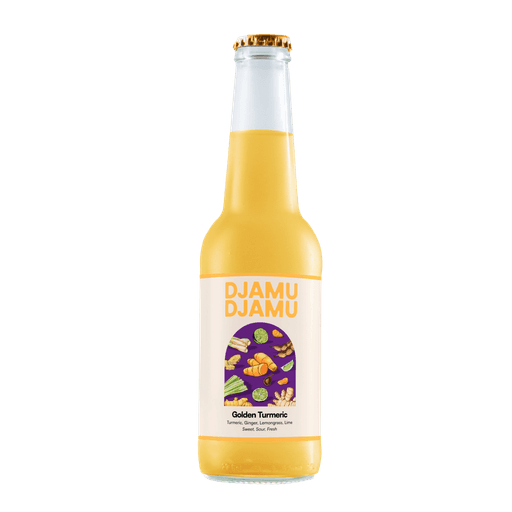
Golden Turmeric is inspired by Indonesia’s beloved Jamu "Kunir Asem". Rooted in heritage, it’s a sweet, sour, and freshness that’s ready to brighten up your day. Ready to try something new?
Meet Golden Turmeric,
Tradition in a Bottle

Golden Turmeric is inspired by Indonesia’s beloved Jamu "Kunir Asem". Rooted in heritage, it’s a sweet, sour, and freshness that’s ready to brighten up your day. Ready to try something new?
Meet Golden Turmeric,
Tradition in a Bottle

Golden Turmeric is inspired by Indonesia’s beloved Jamu "Kunir Asem". Rooted in heritage, it’s a sweet, sour, and freshness that’s ready to brighten up your day. Ready to try something new?
Meet Golden Turmeric,
Tradition in a Bottle



